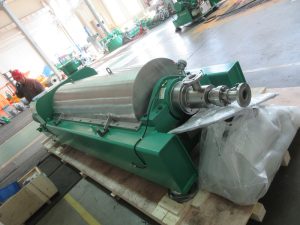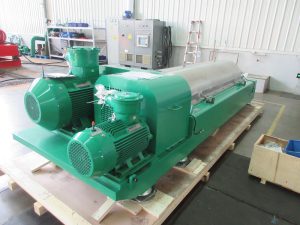Managing oily sludge is a critical challenge for environmental service companies operating in the oil and gas sector. In the United States, strict regulations require effective separation technologies to reduce hazardous waste volumes while recovering valuable resources. For a recent project in the U.S., GN Separation’s GNLWS554 three-phase decanter centrifuge has been selected to address these challenges, offering continuous separation of oil, water, and solids from complex sludge streams.

The GNLWS554 model is specifically engineered for separating emulsified and viscous oil sludges with high solids content. Its three-phase design enables simultaneous separation of oil, clarified water, and dewatered solids in a single continuous process. This capability is essential for treatment plants dealing with tank bottom sludge, API separator residues, or soil washing waste streams.
At the core of its operation is a large-diameter, high-speed rotating bowl that generates powerful centrifugal forces. These forces separate phases based on density differences, with an internal screw conveyor transporting solids to the discharge ports. The machine features wear-resistant materials and a variable-pitch conveyor to handle abrasive sludge while minimizing maintenance downtime.
For the U.S. project, the GNLWS554 was selected based on its processing capacity and its ability to meet local discharge and recycling requirements. By recovering oil suitable for reuse or sale, clarifying water for reuse or discharge, and reducing the volume of solids sent for disposal, the system helps the plant lower operating costs and comply with environmental regulations.

Integration with other treatment equipment is another key aspect. In this project, the decanter centrifuge is used in conjunction with progressive cavity feed pumps that handle viscous sludges reliably. Chemical dosing systems are employed to enhance phase separation, while storage tanks manage recovered oil and water streams. This integrated approach allows for automation and streamlined operation, reducing labor costs and operational risks.
Additionally, the GNLWS554 is designed as a skid-mounted unit, making it easier to transport, install, and maintain. For modular or mobile treatment setups, this is a significant advantage. Companies working on remediation projects or tank cleaning services often require flexible equipment that can be deployed to multiple sites efficiently.
Beyond cost savings, the three-phase decanter centrifuge supports sustainability goals by enabling resource recovery and reducing waste sent to landfills. In a regulated market like the U.S., offering an environmentally responsible solution can be a competitive advantage for service providers.
Overall, this project showcases the practical value of advanced separation technology in tackling real-world challenges in oily sludge management. The GN GNLWS554 three-phase decanter centrifuge exemplifies how engineering solutions can help companies meet stringent environmental standards while delivering efficient, reliable, and cost-effective operations.